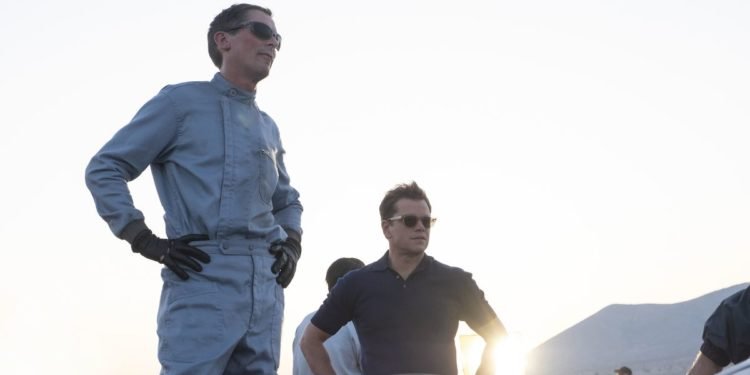On paper, James Mangold’s based-on-a-true-story racing film Ford v Ferrari is a pretty standard good ol’ boys movie. Race-car designer Carroll Shelby (Matt Damon) and irascible driver Ken Miles (Christian Bale) do a good-cop, bad-cop routine through the international racing circuit while sticking it to The Man, or in this case, a variety of men representing The Man. They’re highly specific personalities, but also underdog sports-hero tropes: the rebels who upend the status quo by doing things their own way, leading to inspirational victories.
But Mangold’s direction makes the film something bigger. His writing and directing on films like Logan, Walk the Line, and 3:10 to Yuma shows his knack for reinventing and improving familiar stories, and Ford v Ferrari doesn’t break from that tradition. Shelby and Miles’ story is compelling, but Mangold digs deeper to find the motor that propels Ford v Ferrari across the finish line. There’s a reason cars become a preoccupation for kids, why filmgoers love the Fast and Furious movies, why Sonic and Captain Falcon are so appealing, and why competitive racing has such a following. Going fast is exciting.
Every Ford v Ferrari sequence that involves a car is a thrill, with the revving of the engine dominating the soundscape as cars rush past at seemingly impossible speeds. Mangold cracks Ford v Ferrari open right on the race course. Shelby is behind the wheel during 1959’s 24 Hours of Le Mans race, driving so fast and so perfectly that his car seems to float up from the road and into an alternate dimension. It’s wonderful, which instantaneously puts Shelby and the audience on the same page as soon as the race is over. We all want to go fast again.

Based on the events leading up to 1966’s 24 Hours of Le Mans race in France, Ford v Ferrari sees Shelby sidelined from driving due to a heart condition. He’s offered a second chance at glory when the Ford Motor Company begins to develop racing ambitions, and wants someone to lead their development team. So he calls on his friend Ken Miles, a great racer whose abrasive personality has kept him out of the major leagues. Shelby is recruited to design a race car for Ford that will beat perennial winner Ferrari at 24 Hours of Le Mans, and he brings Miles on to help test the car and drive it in the race.
It’s not just the car, however, that proves to be an obstacle. The development is a protracted processthat means both Shelby and Miles must leap through yards of bureaucratic red tape. Henry Ford II (Tracy Letts) is on board with the racing program, as is Ford Vice President Lee Iacocca (John Bernthal), who suggested it in the first place. But both men have their own idea of how the program should work, which interferes with Shelby’s plans, and the money and egos involved ensure they won’t back down easily. On top of that, a rocky first meeting between Miles and executive Leo Beebe means Beebe will do all he can to keep Miles off of the track.

People familiar with racing history or underdog sports dramas will know well in advance how this all turns out, but Mangold’s baseline focus on speed, speed, speed is enough to make up for any lost suspense. He also doesn’t shy away from the deadliness of racing — cars collide and explode during races, and even during testing, making it a matter of life or death every time Miles gets into a car.
But of course, racing is a calling for these men rather than a hobby, in the same way that Superman ultimately can’t give up saving the world. Damon and Bale, who’ve each played superheroes themselves (Jason Bourne is close enough), capture that feeling well. Writers Jez Butterworth, John-Henry Butterworth, and Jason Keller wisely don’t center the story around Shelby’s own longing for the racetrack: they funnel all his onscreen passion into helping Miles be the first across the finish line. Bale, for once, emanates a sense of fun as Miles, leaning into Miles’ Brummie accent and his hot temper, making him an almost cartoonishly intense maverick — until he finally has to climb into a car and get to racing.
Ford v Ferrari isn’t reinventing the cinematic wheel (and its one-sentence synopsis of “guys racing cars” belies its appeal to those with no interest in racing or sports of any kind), but it’s still impeccably made, with Mangold distilling the story into two essential parts: the thrill of the game, and the thrill of watching people who are good at their jobs do their jobs. That second aspect operates on two levels, both in terms of Shelby and Miles’ efforts to build the perfect car, and in terms of Mangold, Damon, and Bale putting together a thoroughly enjoyable movie.
Ford v Ferrari is in theaters now.















































